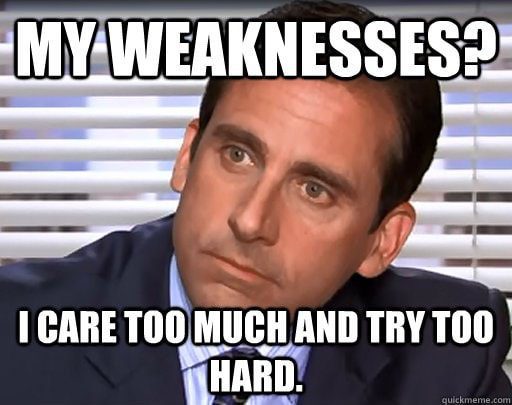
When preparing yourself for a job interview, there are a number of common interview questions that you’ll want to think about. Perhaps the main question that candidates struggle with is ‘What are your weaknesses?’
None of us really like to admit our weaknesses, especially when you’re trying to impress. So how should you approach this common, yet tricky question?
Why interviewers ask this question
Interviewers don’t ask this question just to make your palms sweat. What they’re really assessing is your self-awareness. Let’s face it, no one is perfect. Those who can recognise their weaknesses and take steps to improve them will be more successful at work. Interviewers will want to hear about how you have tackled your weaknesses.
They also want to see how truthful and humble you are. Too many candidates try to get around this question by disguising a strength as a weakness, e.g. I’m too much of a perfectionist. Interviewers have heard plenty of answers like these before and they’re not impressive.
It is always worth having an answer in mind for this question. Coming up with something on the spot is very tricky.
Firstly, be honest with yourself and think carefully about what your weaknesses are. Your weakness should be something that can be improved and it shouldn’t be something that will impact your ability to do the job well.
For example, if you are going for a sales role, saying that your weakness is having the confidence to speak to customers over the phone isn’t a good idea. However, saying your attention to detail could be better is something that you can fix.
Once you’ve got your weakness in mind, you’ll need to talk about how you are correcting that weakness. This is great for interviewers as it shows them that you are self-aware and have the initiative and motivation to bring to a new role and improve your skills.
What you shouldn’t say
 Responses that turn a negative into a positive make you look a bit obnoxious and won’t impress employers.
Responses that turn a negative into a positive make you look a bit obnoxious and won’t impress employers.
Another mistake that candidates make is saying they can’t think of a weakness or don’t have any. Yes, this is a tricky question, but simply not answering it will raise a big red flag. It either suggests that you haven’t prepared properly for your interview, that you’re hiding something or that you are simply big-headed.
You also should be careful that you don’t say too much. It’s important to be honest, however you don’t need to go on about your weakness to the extent that the interviewer may question your ability to do the job.
Bringing it all together
If you prepare your answer and include an explanation about how you are taking steps to improve your weaknesses, then you won’t need to worry about this question coming up.
Did you know: Candidates that actually bring up and are happy to talk about their flaws are more likely to be successful at interview because they stand out from their rivals? Looks like this question could turn things in your favour. Good luck!
Follow us on Twitter, LinkedIn and Facebook for business insights, interview tips, advice and career opportunities.